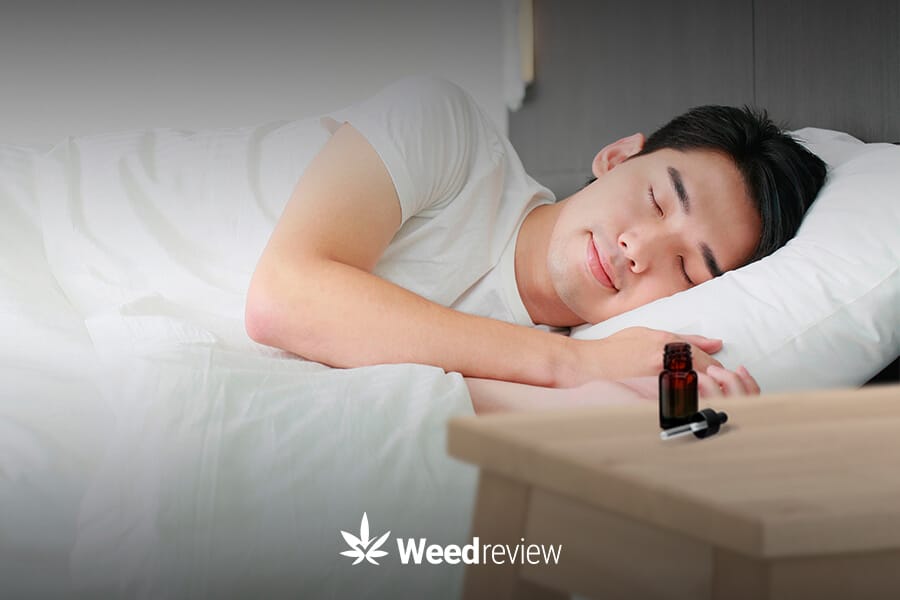
Cannabis for Sleep: Benefits, Risks, Products to Use

Table of Contents
Throughout history, cannabis has been used as a means of reducing pain and improving sleep quality. There are many informal stories that support the idea that marijuana can assist with insomnia. The same seems evident in Thailand, as more adults buy cannabis for sleep.
Can weed help with sleep? The short answer is yes – but this can change as we begin to understand its long-term effects on our bodies better.
Let’s explore how cannabis can impact sleep health and what you need to know before using it as a sleep supplement.
Medicinal marijuana for sleep: the scientific understanding
Studies evaluating the effects of cannabis on sleep have been ongoing since the 1970s. The key findings – summarised below – are mixed.
This may be due to the diverse nature of the cannabis plant itself, which contains over 100 different cannabinoids, terpenes, and other chemicals.
Cannabinoids interact with the body via the endocannabinoid system (ECS). The ECS regulates critical functions, including sleep and circadian rhythms. So, you can assume that by supplementing the ECS with cannabinoids, it may be possible to regulate sleep. The reality, of course, is a lot more complicated.

The current literature notes that cannabis can improve sleep in the short run. A great deal depends on:
- Type of cannabinoids used (CBD, THC) and their ratio
- Dosage
- Timing
- The product for consumption
- Metabolism
- Tolerance & sensitivity to cannabis
- Medical history
Role of CBD & THC
In low doses, THC can improve sleep quality, but in larger doses, it can have the opposite effect. Since this compound is psychoactive, it can overstimulate the mind and cause difficulties in falling asleep. THC is also known to cause addictive tendencies.
Conversely, CBD is non-psychoactive and does not carry the same addiction potential as THC. In low doses, it can be alerting. It can promote sedating effects in mid to high doses owing to its anti-depressant and anxiolytic properties. It can also counter the effects of THC, and the two are to be used together in cannabis-derived medicines.
Reduction in sleep onset latency
Much research has shown that tetrahydrocannabinol (THC) in low doses can reduce sleep latency – the time it takes to fall asleep. Short-term use can also lead to increased sleep time, greater ease of falling asleep, and not waking up often at night.
Decrease in REM sleep
Short-term cannabis use can reduce the time spent in REM (Rapid Eye Movement) sleep. It is where you dream and process emotions and new memories. This is why you do not usually dream when you consume cannabis regularly. This can be particularly helpful for those with PTSD (Posttraumatic Stress Disorder) and nightmares, as marijuana can help them spend more time in deep sleep instead of dreaming.
More time in deep sleep
Cannabis has been shown to have potential benefits for improving deep sleep. Specifically, THC has been found to decrease the amount of time it takes to fall asleep and increase deep sleep, while CBD has been shown to increase overall sleep duration and improve sleep quality.
Improvement in other symptoms
Insomnia may often arise due to other medical conditions like stress, anxiety, chronic pain, nausea, etc. Cannabinoids like cannabidiol (CBD) have been shown to relieve these conditions, thus indirectly contributing to improved sleep.
Changes in sleep architecture
Contrasting results are generally seen with long-term use. The time spent in different sleep stages can be affected by chronic cannabis use, especially if done in high doses. This can potentially mean increased sleep latency, changes to the sleep cycle, reduced slow-wave sleep (the deepest and most restorative stage of sleep) and decreased total sleep.
Increased tolerance
Studies have shown heavy users may also develop tolerance (also known as habituation) to the effects of cannabis over time. As time goes by, users require more quantity to obtain the same results. This progressive increase in the use of weed leads to further sleep disruption.
Sleep problems due to withdrawal
Intense dreams, disturbed sleep, decreased nightly sleep duration, and difficulty falling asleep – the numerous instances of chronic cannabis users experiencing poor sleep after quitting are well documented. These problems increase the risk of returning to using marijuana as a coping mechanism and can lead to the development of cannabis use disorder.
Sleep disorders
The effects and benefits of cannabis for sleep disorders like obstructive sleep apnea, insomnia, REM behaviour disorder, and daytime sleepiness are being studied. We don’t have enough evidence and studies to know if marijuana can effectively treat these conditions, so it’s important to talk to a doctor before using it as a treatment.
Marijuana sleep aid: Products to consider

The legal cannabis market in Thailand has given rise to several medical and recreational cannabis products. It is strongly recommended to seek medical advice when using these to treat chronic sleep disorders like insomnia.
Cannabis strains
Indica-dominant strains of cannabis are often recommended for their sleep-enhancing properties. Strains like Granddaddy Purple, Northern Lights, OG Kush, and Afghan Kush are rich in cannabinoids such as THC and CBD, which work together to relax the mind and body, promoting a restful night’s sleep. These strains can be consumed via smoking.
If you do not like psychoactive effects, you may opt for CBD buds like Charlotte’s Angel.
Cannabis oils
Cannabis oils are concentrated extracts of the cannabis plant, containing a balanced combination of THC and CBD. These oils can be taken sublingually or mixed with food and beverages, making them a discreet and convenient option for sleep aid.
Products with a balanced THC-to-CBD ratio may provide more relaxing effects without the cerebral effects associated with THC. You may also opt for cannabis-based medications like GPO THC oil by speaking to your doctor.
CBD oil
CBD oil, derived from hemp or cannabis, contains little to no THC and is praised for its therapeutic effects without the “high.” Its potential benefits include reducing anxiety, pain, and inflammation, which can contribute to better sleep quality.
Cannabidiol tinctures can be taken sublingually (under the tongue for 30-90 seconds), added to food, or applied topically.
Edibles & gummies
Available in various forms, such as chocolates, cookies, and gummy bears, these products often have a more gradual and longer-lasting effect than other methods. Look for edibles with a balanced THC-to-CBD ratio and start with a low dose.
Be careful to eat only a few as they take time to kick in, and when they do, you may stay up all night. If you are new to edibles and gummies, read our instructions for eating edibles.
Improving sleep with weed: Best practices
While weed can help with sleep issues like insomnia in the short run, there is no standard playbook for achieving this. It is because marijuana affects each person differently, depending on biological factors like weight, metabolism, age, gender, cannabis tolerance & sensitivity, etc.
The best way to start is low and slow.
If you are new to medicinal cannabis, start with a small amount, see how it helps you, and then increase it until you find the desired effects. It would help if you also spoke to your doctor about the best dosing regimen.
The following points should help you realise how to use cannabis for sleep best.
Be mindful of the effects & dosage
It’s essential to know the effects and quantity when using THC. Its sedative effects can be accompanied by a psychoactive high that some people may find unpleasant. Expected outcomes of THC usage include hunger, euphoria, increased focus and energy levels, and an overactive mind, which are more evident at higher doses.
Pay attention to the dosage to ensure the safe consumption of THC-rich formulations for sleep.
By contrast, CBD products have no such problems – making them a better option for those who do not like getting high.
Time your consumption
You will feel the effects immediately with smoke. Tinctures and oils can take 15-20 minutes if taken sublingually – and longer if mixed with food or drinks. Edibles take the longest time.
You must plan your sleep time according to what product you take and how you plan to take it.
For example, if you are taking gummies, give yourself a couple of hours before sleep, while with flowers, 30 to 45 minutes seems like a reasonable timeframe. That said, the timing will vary from person to person, so the best way to realise your ideal timing is through trial and error.
Choose quality products
When it comes to purchasing cannabis products, choosing high-quality products is essential. It’s crucial to source your products from reputable vendors and to look for certificates of analysis labels, third-party lab tests, ingredient lists that attest to the quality, and a contaminant-free formulation.
Try different products
Given the number of marijuana strains, CBD oils, and gummies available in the Thai market, there is no shortage of choice. Some products may not suit you well, while others can bring you the comfort you have long hoped for. Since cannabis affects each person differently, trying out different products can give you a sense of what works for you and what does not.
Risks & side effects
Common risks of cannabis include dry mouth, high blood pressure, paranoia, anxiety, increased heartbeat, dizziness, and nausea. Not everyone may experience these side effects as they depend on metabolism, tolerance, dosage, and the kind of product taken.
If you are on prescription medicines, you will need to be extra careful, as cannabis can interfere with the medications in your system. Speak to your doctor to identify the best course of action to add marijuana to your daily routine.
Can weed make sleep worse?
Regular cannabis use can disrupt the natural sleep cycle, leading to decreased time spent in rapid eye movement (REM) sleep. This is important for memory consolidation and emotional regulation.
In addition, studies have also shown that cannabis use can lead to a decrease in slow-wave sleep (SWS), which is the deepest and most restorative stage of sleep. This is why it is common to wake up groggy and tired in the morning after a night of heavy cannabis use.
Furthermore, sudden stopping of cannabis use can lead to rebound insomnia, where people experience difficulty falling and staying asleep without weed. This is a common sign of cannabis withdrawal – which may last for anywhere between a couple of weeks to a few months or more.
Alternative sleep remedies to cannabis
Cannabis is one of the many ways to get your bedtime routine back on track. There is still much to learn about this plant compared to other options. Therefore, you may check out other options if weed does not work for you.
It all starts with an emphasis on sleep hygiene, which refers to the practices and habits that promote healthy and restful sleep. This includes being consistent, following a diet plan, creating a restful environment, exercising, and more.
While you work on building good sleep hygiene, you may also try the following:
- Melatonin supplements
- Valerian root
- Chamomile tea
- Lavender aromatherapy
- Meditation and relaxation techniques
- Establishing a sleep routine
Conclusion
Looking at the current research, it appears that cannabis can be effective in promoting deep sleep and improving sleep quality in the short term. However, long-term use may have negative impacts on your sleep cycle and overall health. Then, it is also a matter of how CBD and THC individually play a role in this. In short, more studies are needed to fully understand the complicated link between cannabis and sleep.
Despite this uncertainty, many people have reported improved sleep after using cannabis – clearly, it has potential. If you are considering using medical marijuana for sleep, speak to a doctor to determine the best course of action for your individual needs. In the meantime, you can learn more about cannabis below.
FAQ
-
How does cannabis affect sleep?
In the short run, cannabis can improve sleep quality by increasing the time spent in deep sleep and overall sleep duration, decreasing the amount of time it takes to fall asleep. In the long run, chronic cannabis use may disrupt the body’s natural sleep cycles and lead to sleep disturbances over time.
-
Can chronic cannabis use for sleep make me addicted?
Yes, the endocannabinoid system can become desensitized to THC, which may lead to tolerance and a reduced ability to induce sleep, prompting the user to consume more cannabis. This dependence can lead to addiction, where the individual experiences cravings and withdrawal symptoms. This is why chronic use of cannabis for sleep should be approached with caution and under the guidance of a medical professional.
-
Which cannabis product is good for sleep?
Beginners may want to try high-concentration CBD oil for sleep as they are non-addictive and non-psychoactive. Other options include THC flowers and cannabis edibles, but they must be taken with caution. It is best to speak to your doctor before using marijuana as a sleep aid.
-
Can I take cannabis with sleep medicines?
Cannabis is known to interact with other medications, leading to potentially harmful drug interactions that are not good for your body. If you are adding cannabis to your daily routine which also includes prescription drugs, please consult your doctor for the best course of action.


